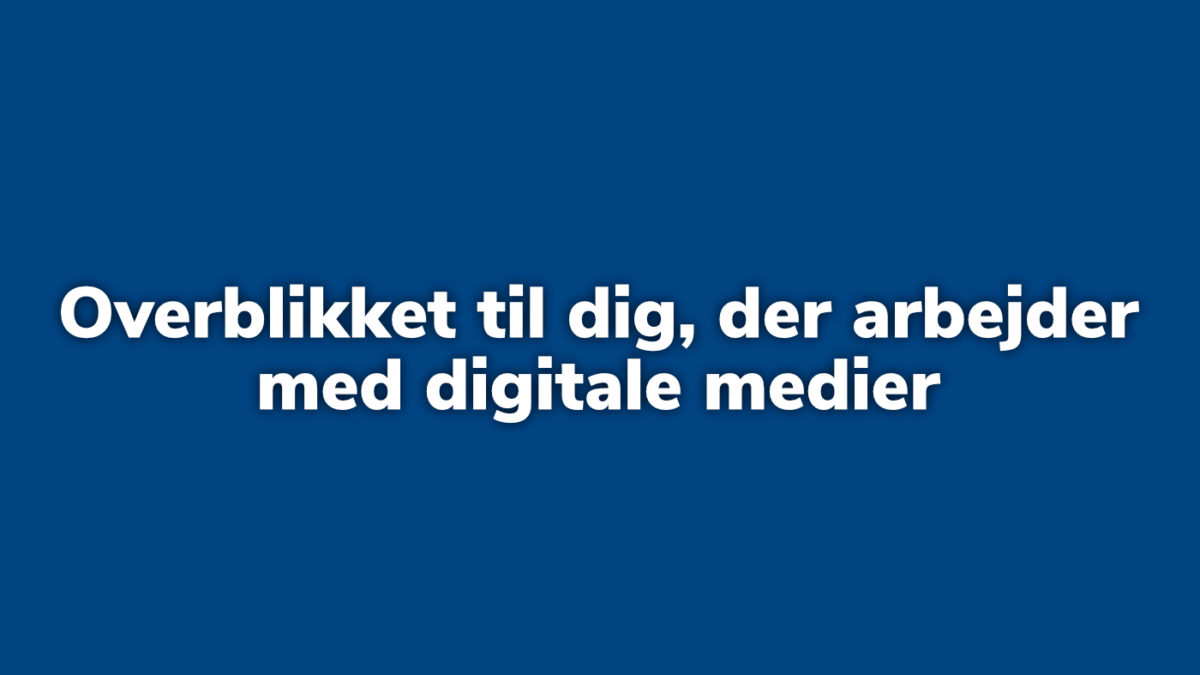Digitale tendenser, uge 41 (2020)

Her finder du Ugerevyen fra uge 42 »
Her har du den mest komplette opdatering på sociale medier og digital udvikling i mediebranchen. Du bliver holdt opdateret og sparer masser af tid.
Digital Ugerevy udgives af Lars K Jensen, der rådgiver, udvikler og arbejder med digitale medier og udvikling.

Del 1: Sociale medier

Her finder du historier om eller fra de store sociale platforme, der har en enorm rolle at spille i kontakten mellem udgiver/afsender og modtager.
👊
Facebook slår *hårdt* ned på QAnon
NBC News:
“Facebook said Tuesday that it is banning all QAnon accounts from its platforms, a significant escalation over its previous actions and one of the broadest rules the social media giant has put in place in its history.”
Som tech-journalist på Zetland, Frederik Kulager, skriver på Twitter:
“Efter lang tids nølen har Facebook her til aften udslettet QAnon fra Facebook i en skala, jeg ikke mindes at have set lignende. Alt QAnon-relateret slettes. Selv den gruppe, jeg var medlem af, hvor danskere holdt øje med Q her til lands er pist væk.”
😕
Politiske annoncer bliver forbudt på Facebook… efter valget
The Verge:
“Facebook will ban US-based political ads indefinitely after the presidential election, attempting to forestall confusion over its results. “While ads are an important way to express voice, we plan to temporarily stop running all social issue, electoral, or political ads in the US after the polls close on November 3rd, to reduce opportunities for confusion or abuse,” the company says.”
😠
Facebook svarer igen på ‘The Social Dilemma’-filmen
Social Media Today:
“In a very uncharacteristic move, Facebook has today issued an official rebuke to claims made in the new Netflix documentary ‘The Social Dilemma‘, which aims to provide an overview of the various ways in which social media platforms have become increasingly divisive and dangerous as their usage has increased over time.”
🎃 Messenger er ved at gøre klar til Halloween
Social Media Today:
“The advantage of that could be that you won’t have to put in so much effort with your Halloween costume – and if you really can’t be bothered dressing up, Facebook’s got you, with some new Messenger features that’ll enable you to look ‘spooky’ without having to do anything more than tap on a visual effects button within a Messenger video call.”
😷
Facebook og Twitter fjerner og gemmer Trumps COVID-påstand
BBC:
“Facebook has deleted a post in which President Trump had claimed Covid-19 was “less lethal” than the flu. […] Twitter hid the same message behind a warning about “spreading misleading and potentially harmful information”.”
🙅♂️
Nej, Facebook har ikke bias mod konservative
NPR:
“But the facts to support that case have been hard to find. NPR called up half a dozen technology experts, including data scientists who have special access to Facebook’s internal metrics. The consensus: There is no statistical evidence to support the argument that Facebook does not give conservative views a fair shake. “
🎂
Instagram fylder 10 år
Platformer / Casey Newton:
“Ten years ago today, Kevin Systrom and Mike Krieger released Instagram into the world. Less than a year and a half later, Facebook acquired it, in one of the shrewdest acquisitions in the history of business. Instagram is now one of the most popular apps in the world, and has thrived during the pandemic. But regulators and competitors continue to nip at its heels — TikTok has reportedly now surpassed it as the second-most popular app for teens, after Snapchat — and there’s no telling what it might look like a decade from now.”
I den forbindelse har han også interviewet Sarah Frier, der udgav en bog om Instagram – ‘No Filter’ – tidligere i år:
Casey Newton: When you open Instagram today, which parts of the app feel basically the same as they did a decade ago?
Sarah Frier: The main feed is still very similar to how the founders imagined it. It’s still this place where we portray our lives as more curated and and polished than they actually are — which is something that we learned to do because of Instagram’s filters in the early days.
But the app has gotten so much more complicated — and I think that it’s becoming more and more Facebook-like.
Du kan læse min anmeldelse af ‘No Filter’ hos Journalisten.
↓
Social Media Today har lavet en infografik om Instagram i anledning af de 10 år, der er gået.
👍 Instagram tester ny proces vs. hårde kommentarer
Social Media Today:
“October is National Bullying Prevention Month, and in-line with the awareness push, Instagram’s adding some new tools to help reduce cyberbullying within its app, and protect, in particular, its younger, more susceptible, audience cohort.”
🏷
Nu bliver statsmediers profiler markeret på Instagram
Engadget:
“Over the last week, Instagram has started labeling state-backed media, following through on a policy the company’s parent Facebook announced last October and started implementing on its own social media network this past June. “
🏴☠️
Twitter forbyder dødsønsker mod Trump
Gizmodo:
“On Friday, the same day Trump announced on the social media network that he and first lady Melania Trump had tested positive for covid-19, Twitter told Motherboard that its users are not allowed to “openly hope” for the president’s death on the platform. Doing so would result in tweets being removed, Twitter said, referring to an “abusive behavior” rule that Motherboard reports it’s had since April. “
🐦
Birdwatch: Twitters værktøj i kampen mod misinformation
TechCrunch:
“Twitter is developing a new product called “Birdwatch,” which the company confirms is an attempt at addressing misinformation across its platform by providing more context for tweets, in the form of notes. Tweets can be added to “Birdwatch” — meaning flagged for moderation — from the tweet’s drop-down menu, where other blocking and reporting tools are found today. A small binoculars icon will also appear on tweets published to the Twitter Timeline. When the button is clicked, users are directed to a screen where they can view the tweet’s history of notes.”
👻
Snapchat lancerer First Commercial-annonceformat
Snapchat For Business:
“In the spring of 2020, we began testing our first ever video takeover product – First Commercial. This high-impact product guarantees advertiser ownership over the first ad experience that a user sees on a given day within premium Shows in Discover. Today, we are excited to release First Commercial to advertisers in Ads Manager.
This new video takeover solution runs exclusively within curated, brand safe, made for mobile programming.”
Del 2: Digitale tendenser

Her kan du læse nogle af ugens tendenser indenfor medier. Det kan være en ny metode eller tilgang, branchen forsøger at tage til sig.
✋
DR.dk vil kun udkomme 5 gange om dagen
Journalisten:
“‘Pejlemærket er, at vi publicerer i faste udgivelser på forsiden af dr.dk hen over dagen, og at vi fastholder vores prioritering i længere tid. Dermed bevæger vi os væk fra en publiceringsmodel, hvor vi løbende skiftede historierne ud efter, hvad der kom ind, og hvad der skete,’ forklarer [nyhedschef] Thomas Falbe.”
📱
Google lancerer Stories med indhold fra medier
TechCrunch:
“Google announced today it’s introducing a Stories feature to its Google app for iOS and Android, which now reaches more than 800 million people per month. In a new carousel within the app, users in supported markets will be presented with a row of tappable visual Stories from participating publishers. These Stories can include full-screen video, photos and audio, and can link out to the publisher’s other content, if desired.”
🎧
Forlag går sammen om ny bog-streaming
Bag ‘Chapter’ står Gyldendal, Modtryk og Gad.
Computerworld:
“Priserne debuterer ved 69 kroner for 12 timers streamet lydbog per måned, mens der for 99 kroner per måned tilbydes ubegrænset forbrug. To-bruger eller familiepakker løber op i henholdsvis 149 og 189 kroner per måned. Der kan spares yderligere 15 procent ved at købe et års abonnement.”
🤥
Medier er “bedst” til at sprede misinformation fra Det Hvide Hus
MIT Technology Review:
“Benkler’s team just published its study, which examines the president’s disinformation campaign against mail-in votes and details the methods—and people—he’s using to accomplish his goals. The findings found that some of the biggest names in American mass media and the political elite are primarily responsible, and that social media plays only a secondary role. The findings run contrary to the popular idea that it’s foreign troll factories doing the worst disinformation dirty work.”
🎮
Wired og Protocol lancerer spildækning
Som du kunne læse i Ugerevyen fra uge 37, vil bl.a. Wired dække spilindustrien endnu mere. Dengang skrev CNN:
“The Washington Post, Bloomberg, and Wired have each announced investments in gaming coverage in recent months. These publications and others are looking to capitalize on this booming industry with the same rigor they’ve shown in reporting on Hollywood and Silicon Valley. The plan is to investigate the business and culture of the gaming industry with stories that appeal to gamers and non-gamers alike. “
Nu er Wired så klar og har lanceret sektionen Wired Games. Hvis du vil vide mere, kan du læse denne velkomstartikel, Alan Henry (der kalder sig “vært”) har skrevet:
“Of course, WIRED already offers great coverage of video games—as a business, as a force of culture, and as entertainment—but WIRED Games is a place where we can do even more. We’ll bring you investigations and behind-the-scenes looks at the industry, along with profiles of the artists, designers, streamers, and developers who bring your favorite worlds to life. We’ll also feature reviews and impressions of games we think you should play, gear that will improve your gaming experience, and tips and tools to play smarter, not harder, and enjoy the time you spend gaming.”
Du kan tilmelde dig nyhedsbrevet her.
↓
Tech-mediet Protocol har også lanceret deres nye nyhedsbrev, Protocol Gaming.
📬
MIT Technology Review klar med popup-nyhedsbrev om valget
MIT Technology Review:
“All of this is why MIT Technology Review is launching the Outcome, a pop-up newsletter focused on the security and integrity of the election. It will cover topics such as misinformation, voting machines, and cybersecurity, but above all it will ask the same questions of the election that we ask of every technology: Is it working as intended? How are power and money shaping it? How is it being used and misused? What are its strong and weak points? Is it, ultimately, safe?”
🤖
Nyt dansk medieovervågningsfirma kører på AI
Efter at have gået stille med dørene har MediaCatch nu set dagens lys. Det er et medieoverevågningsfirma, der samtidig er det første spin-off fra det samfundsfaglige fakultet ved Syddansk Universitet.
Bag MediaCatch står nogle navne, der vil være kendte blandt flere i branchen. Holdet er:
- Filip Wallberg (CTO)
- Lars Damgaard Nielsen (CEO)
- Anders Glent Buch (CAIO)
De bruger blandt andet kunstig intelligens såsom ansigtsgenkendelse til at detektere medieoptrædener og -omtaler.
Du kan læse mere på deres hjemmeside eller i fx Filips Wallbergs LinkedIn-opdatering.
Del 3: Business

Her kan du læse nogle af ugens historier og tendenser indenfor forretningsudvikling i mediebranchen. Altså det, der handler om at tjene penge.
👎
Zetland-direktør kritiserer mediehjælpepakke
Zetland:
“Forleden bragte MediaWatchs morgennyhedsbrev to historier, der øjensynligt intet havde med hinanden at gøre – og så alligevel havde alt med hinanden at gøre. Den ene historie handlede om, hvordan de medier, der allerede får produktionsstøtte, nu kan søge om at få dækket faldet i reklameindtægter under coronakrisen. Den anden historie handlede om, at Jysk Fynske har erkendt, at med de nye cookieretningslinjer er den annoncefinansierede forretningsmodel på nettet endegyldigt stødt på land og må erstattes af en anden: Brugerne må for fremtiden betale en større del af det, det koster at producere kvalitetsjournalistik.”
📻
Berlingske bliver medejer af Radio Loud
MediaWatch:
“‘Vi kan se talenter, der folder sig ud hos Loud, og det vil vi gerne understøtte,’ siger Anders Krab-Johansen, koncernchef i Berlingske Media, i meddelelsen.
‘Berlingske Media er optaget af lyd og podcast, og her udvikler Loud nogle særlige kompetencer i forhold til unge, som er vigtige for uafhængige medier.'”
↓
Andre MediaWatch-historier om den nyhed:
- Berlingske Media vil bygge bro til unge og hæve lyttertal som ny medejer af Loud
- “Jeg tror mere, det er Berlingske Media, der ser fordele i at få os med”
- Berlingske Media vender tilbage til public service-radio med indtræden i Louds ejerkreds
↓
Og en til om Loud:
Loud-direktør løfter sløret for podcast-tal: “Det vigtigste er, at det langsomt stiger”
😇
News Corp skruer ned for kritikken af giganterne
Som det lyder i DJ Shadows ‘Why Hip-Hop Sucks in ’96‘: “It’s the money”.
Axios:
“One of the biggest news publishing companies in the world has slowly backed away from its harsh public criticism of Big Tech platforms, as companies like Google and Facebook have begun to open up their wallets to news companies. “
📲
Sådan blev tysk regionalavis “digital first”
Journalism.co.uk:
“To understand the needs of its audience and refine digital products, the publisher tests new approaches across its website, e-paper, digital paid offering, newsletters, video and audio.
Testing means that newsroom leaders spend a lot of time fostering a culture of collaboration, respect, and trust, making sure everyone is striving towards the same goal across departments. “
Del 4: Udvikling og tech

Her får du et kig på nogle af ugens historier indenfor den digitale udvikling og teknologi, der enten direkte eller indirekte kan have betydning for medier/udgivere.
🤖
GPT-3-bot sluppet lys på Reddit
The Next Web:
“Many of the bot’s responses were harmless and amusing, such as a story about a colony of humans living in elevator shafts, which is currently its most popular post. But others promoted conspiracy theories and discussed extremely sensitive topics that attracted sincere responses from users.”
✂️
Amerikanske politikere vil splitte tech-giganterne op
The New York Times:
“In a report led by Democrats, lawmakers said Apple, Amazon, Google and Facebook needed to be checked and recommended they be restructured and that antitrust laws be reformed.”
↓
Mangler du læsestof? Så kan du læse rapporten, der er på 449 sider.
↓
TechCrunch har samlet op på giganternes reaktioner.
📕
Ny bog peger på adtech som den næste boble
Wired:
“Hwang’s new book, Subprime Attention Crisis, lays out the case that the new ad business is built on a fiction. Microtargeting is far less accurate, and far less persuasive, than it’s made out to be, he says, and yet it remains the foundation of the modern internet: the source of wealth for some of the world’s biggest, most important companies, and the mechanism by which almost every “free” website or app makes money. If that shaky foundation ever were to crumble, there’s no telling how much of the wider economy would go down with it.”
↓
“Does digital advertising work?”
The Media Nut
🙄
Slack introducerer også Stories
The Verge:
“While Instagram stories are designed to share your every day life experiences with friends and family, Slack’s stories aren’t really about videos of your pets, favorite food, or vacations. Slack sees the video snippets as a way for remote workers to check in and provide status updates, for example, or to set the daily agenda for a team.”
🗳
Californien skal stemme om privacy-lov
Recode:
“Proposition 24, also known as the California Privacy Rights and Enforcement Act of 2020 (CPRA), is supposed to expand a landmark California privacy law that passed two years ago; there’s a good chance Californians will approve this one, too. It’s framed as legislation that will better protect their privacy — in particular, sensitive data such as Social Security numbers, race, religion, and health information. […]
That unbridled data surveillance by some big tech companies outside of their own user-facing services — that is, Google and Facebook’s ability to track you even when you’re not on their properties — has undermined consumer trust in the entire digital economy. Giving consumers the ability to control their own data should help restore some of that trust.”
📉
Chrome mister markedsandele
…i stedet ser det ud til, at Microsofts browsere går fremad (det er vist længe siden, det sidst er sket?):
Computerworld:
“Ifølge data fra analysevirksomheden Net Applications ryger Chromes globale markedsandel under den magiske grænse på 70 procent med en markedsandel på 69,9 procent i september 2020.
Tilbagegangen er på hele en procentpoint, hvilket er den største for Chrome-browseren siden oktober 2019, hvor selskabets browser gik hele 1,1 procentpoint retur.”
